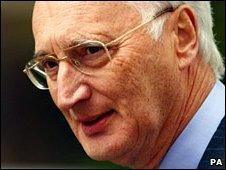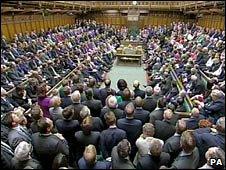Commons needs to be more 'box office', says Sir George
- Published

Sir George said often MPs did make the Commons their main focus
Sir George Young has suggested changes to boost the importance of the Commons - and its press coverage.
In a speech, he said twice-yearly grillings of prime ministers by a committee of senior MPs had "failed to spark" and received little coverage.
The Commons leader said "turgid" annual debates could be replaced with "punchy" sessions on topical issues.
This could boost both press and MPs' interest and make the Commons "more box office, less 'am dram'," he said.
On Tuesday MPs voted to set up a committee giving backbenchers more control over Commons business.
'Set pulse racing'
The committee - one of the reform proposals aimed at increasing the power of the Commons to hold the government to account - will be able to schedule debates on issues of its choosing.
In a speech to the Hansard Society on parliamentary reform, Sir George said it was now up to MPs to "respond positively and responsibly" - and the new committee should consult widely about debates, to encourage better turnout.
Fifteen annual "set piece" debates on issues like defence or International Women's Day could also be looked at to see if something "could be developed in their place that would set the pulse racing a little faster", Sir George said.
And "important" select committee reports - which sometimes receive little fanfare - could be launched in the Commons chamber, with their conclusions voted on to give them more weight, he suggested.
Sir George said he would be taking forward plans to allow Opposition MPs to use some of their parliamentary time to demand statements on topical issues by the relevant minister - similar to "urgent questions", which are currently debated at the discretion of the Speaker.
"All too often MPs themselves do not see the point of making the chamber the primary focus on their activities. Our proposals will seek to transform this by replacing long, thinly-attended and turgid debates with short and punchy statements that will get far greater air time - more box office, less 'am-dram'."
Newspaper coverage
Sir George also said that the liaison committee, made up of all select committee chairmen, had to "step up to the challenge".

MPs' sitting hours should be looked at again, said Sir George
The committee questions the prime minister for two and a half hours on a wide variety of topics twice a year - but Sir George said it had "so far failed to spark".
"One-hundred-and-fifty minutes with the prime minister, cross-questioned by Parliament's most effective examiners, ought to be one of the most important events in the political calendar. It hasn't been. We never laid a glove on Tony Blair and Gordon Brown's appearances were heavy weather."
He said one session received "next to no coverage at all in the newspapers with only a brief mention on the BBC's Yesterday in Parliament".
Sir George suggested the format is looked at again, to allow a "more mature conversation" with "less party political point-scoring", so the sessions can effectively scrutinise the prime minister while giving people "a better insight into the PM's goals and what drives him".
On Tuesday MPs backed plans for the Commons to sit in September for the first time since 2004.
Sir George said the Commons' procedure committee might want to revisit MPs' sitting hours and recess dates, adding that the public did "not understand why we take 82-day summer holidays", and at rescheduling party conferences so MPs can sit for longer in September.
"I am conscious that the last time the House considered MPs' sitting hours, a lively debate ensued for about three years," he said.
"This is something that we should take on carefully and cautiously - but with the ultimate aim of ensuring that the public gets the best value out of their elected representatives."
- Published15 June 2010
- Published10 June 2010